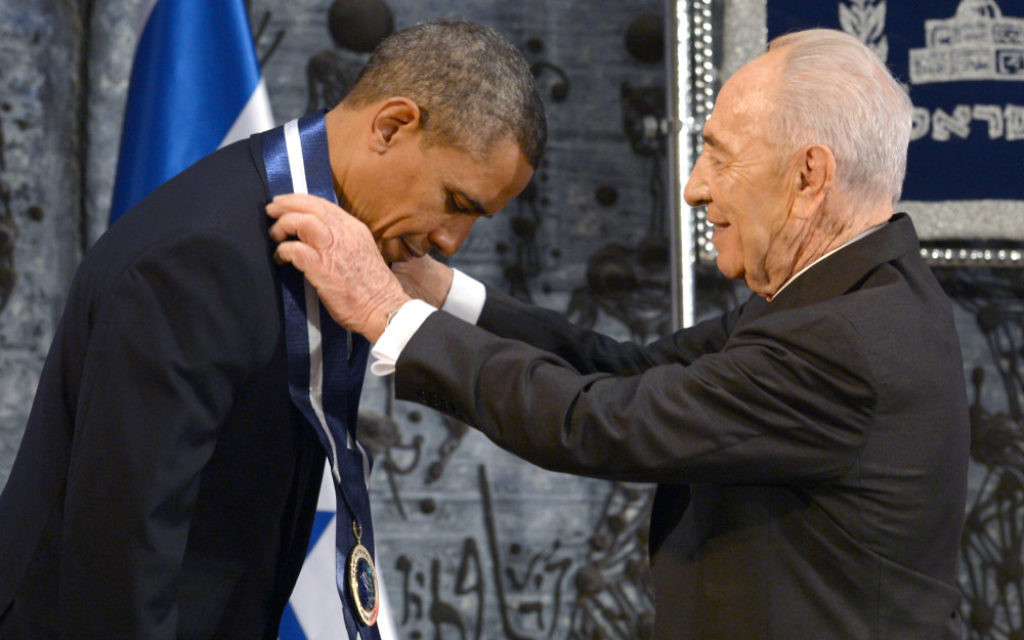Peres Funeral: ‘Todah Rabah, Chaver’
World leaders who sometimes bicker united Friday morning, Sept. 30, to bid farewell to a man whose friendship they cherished above any political differences.

“I took great pleasure in my friendship with this older, wiser man,” President Barack Obama said at the funeral for Shimon Peres in Jerusalem’s Mount Herzl Cemetery.
Obama, who said he was the 10th U.S. president to meet with Peres and the 10th “to fall victim to his charms,” closed the last of nine eulogies at the ceremony by saying, “Todah rabah, chaver yakar” (thank you, dear friend).
Get The AJT Newsletter by email and never miss our top stories Free Sign Up
Peres, 93, who died early Wednesday of complications from a stroke two weeks earlier, was the last leader from Israel’s founding generation, a man who spent 48 years in the Knesset, served in 12 Cabinets in roles ranging from immigrant absorption to defense and foreign affairs, twice was prime minister, and capped his career with seven years as president from 2007 to 2014. He suffered devastating political defeats and bitter diplomatic disappointments, but he always bounced back.
Former President Bill Clinton said in his eulogy that he “always was in awe of his endless capacity to move beyond even the most crushing disappointments.”
Peres organized the Israel Defense Forces at the behest of David Ben-Gurion, persuaded the French to help Israel become a nuclear power, pushed the development of Israel’s high-tech sector, encouraged the settlements during the 1970s in the territory captured during the Six-Day War, became a leading advocate of the peace process, shared the 1994 Nobel Peace Prize for negotiating the first Oslo Accord with the Palestinians, and, according to the Jerusalem Post, claimed to have stopped Prime Minister Benjamin Netanyahu from striking Iran’s nuclear facilities.
Netanyahu, who as Likud leader defeated Labor’s Peres in the 1996 elections, said their friendship began in 1976 after his brother, Yonatan, was killed leading the raid Defense Minister Peres ordered on Entebbe to free the hostages of Palestinian skyjackers.
“Shimon, my friend, you said that one of the few times you shed a tear was when you heard the tragic news of the death of my brother, Yoni, in Entebbe. You cried then, Shimon, and today I weep for you,” Netanyahu said. “I loved you. We all love you.”
He did not deny that they had deep political differences. The prime minister said Peres saw peace as the true security, while his own view was that security was essential to achieve peace.
Over time, Netanyahu told a crowd packed with current and former leaders from more than 70 countries, including Palestinian Authority President Mahmoud Abbas, he has come to realize they were both right. “Power is not an end in itself; it’s a means to an end. That goal is to ensure our national existence and coexistence, to promote progress, prosperity and peace — for us, for the nations of the region and for our Palestinian neighbors.”
Novelist Amos Oz said people laughed at Peres for being a dreamer, but, like the original dreamer, Joseph, he made most of his dreams come true. The dream of peace with the Palestinians hasn’t come true yet, but it’s inevitable, Oz said, because both peoples have nowhere else to go. What’s required are leaders on both side who can face that reality.
Oz said he talked to Peres every Friday the past 42 years, and “as long as Israel is alive … its conversation with Shimon Peres will continue.”
Clinton said people were wrong to call Peres, a friend of 25 years, a naive, overly optimistic dreamer. “He knew exactly what he was doing in being overly optimist. He knew exactly what he was doing with his dreams.”
Tracing Peres’ history, including the Nazis burning alive his cantor grandfather and other Jews in their synagogue in the shtetl where he was born in what is now Belarus, Obama emphasized how remarkable it was that Peres’ dreams did not become nightmares.
His understanding of the anti-Semitism and evil in the world “would never harden his heart,” Obama said. “It would never extinguish his faith. Instead, it broadened his moral imagination” and helped him see the world as it should be.
The president said he and his Israeli friend lived unlikely lives in countries that paralleled each other in their devotion to Judeo-Christian ideals, belief in the value of the individual, deep flaws throughout their history and ability to pursue a better world.
He cited Abbas’ presence as a reminder of the unfinished business of peace. While several Arab nations sent delegations to the funeral, no Arab head of state attended.
“The region is going through a chaotic time. Yet he did not stop dreaming, and he did not stop working,” Obama said of Peres.
His optimism “makes us not just honor Shimon Peres, but love him,” he said. “He believed in us even when we doubted ourselves.”





comments